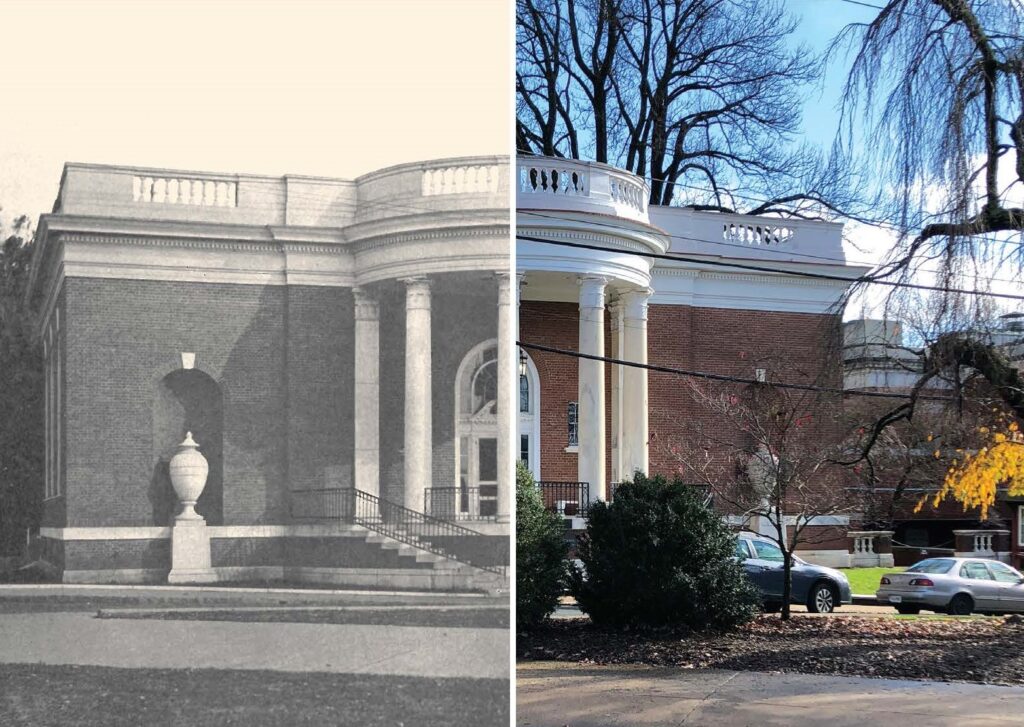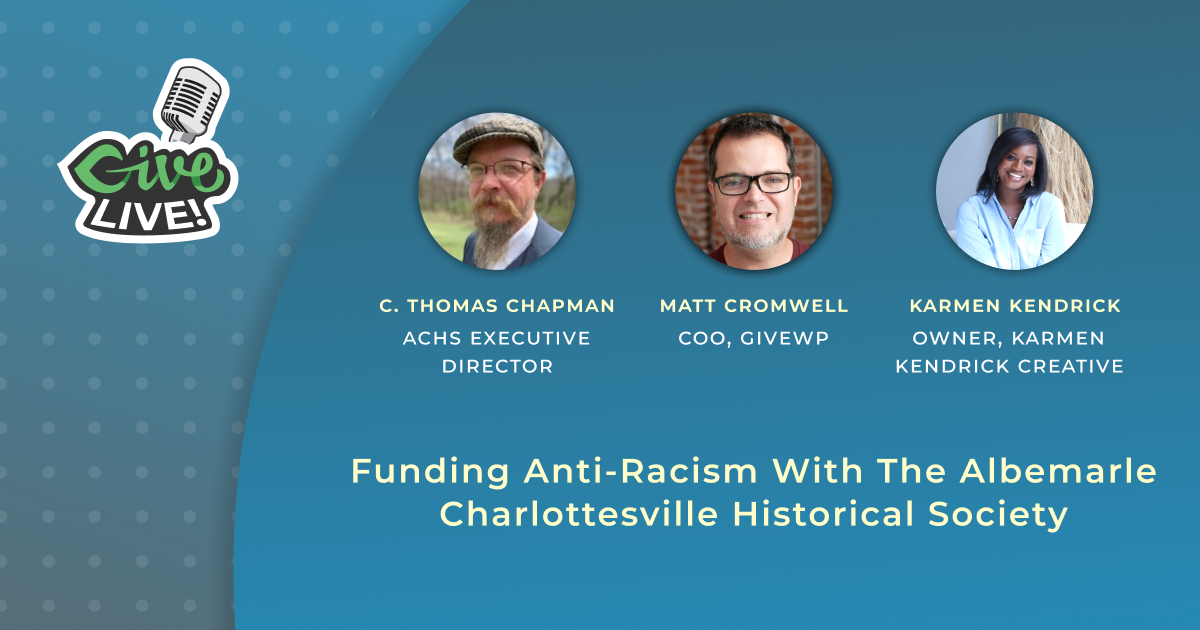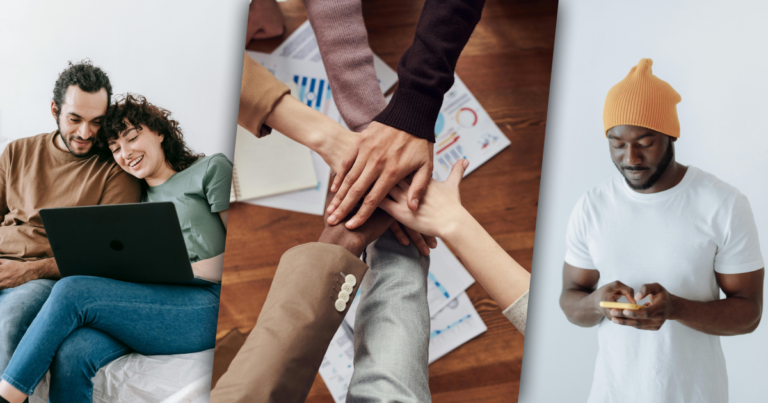The Albemarle Charlottesville Historical Society is fighting to bring peace and understanding to a city at the center of some of the most prominent racial conflicts in recent years.
We’ve followed their story as a GiveWP user through the past few years and have invited them to participate in Give LIVE to discuss their organization, the challenges they face, and how their community is coming together during these tumultuous times.
Watch the Give Live Recap
The History of the Albemarle Charlottesville Historical Society
ACHS is an eighty-one-year-old local historical society, dedicated to collecting and preserving the history of the community. It is home to one of the best research libraries in the area as well as a museum with historical items of interest. The society also publishes an annual historical academic journal.
In addition to their one-of-a-kind archives, papers, and photos Reaching out, the society is reaching out to the community for more oral histories, incorporating more online events, and reaching more people overall.
Who defines history? Where does it come from? How do we know it’s history and not heritage?
“There’s no real one person responsible for history, but if you look at history… it’s looking at the documents; looking at what people in the past did.. that you can verify with documentary information.
So, heritage is… how each individual and a family looks at their past and picks and chooses what defines them as a person, what defines them as a group. That becomes a collective memory, where a group of people come together and have a collective memory.
There’s a hill that we have to climb as a historical society. Eighty years of history that we’ve collected is important, but there’s also a perception of who we represent and what we represent. What I’m trying to do, and what our board of directors is trying to do, is to tell the whole history and to be able to say that we are an active civic organization that wants to tell the whole history…”
What has ACHS been doing to overcome the “whitewashing” of history in the community?
Right now, the effort to ensure all voices are heard and history is written by everyone is the main focus of ACHS. They don’t have one particular fundraising activity or initiative, but they do approach this issue in everything they’ve recently been doing.
“I would say our online program has kind of been a silver lining with COVID. Whereas before if we had thrown an event or program, there may have been people who would be a little hesitant walking through our doors, even if it was a speaker that they wanted to see or that they knew that would be telling them something they were interested in hearing. By having these online programs… in the comfort and security of their own home, they can participate in a program that they might not have been able to previously.
We’ve seen a large group of folks that have been participating in our online programs, and I think it’s getting the word out there that whatever you may have perceived the historical society to be, that we are at least making attempts to break that perception and break down those barriers.”
Statement on Monuments
Since the incident in 2017, racial conflict in the United States has only escalated. Charlottesville and Albemarle County have been no exception. In 2020, the County removed one of the Confederate monuments that stood as a reminder of the 2017 violence.
However, the Historical Society does not believe that this will solve our social problems. They have a more comprehensive approach in mind:
“Removal of monuments from our public spaces will not change our history. Inequality, injustice, and division remain, and the conversations and conflict over our complex past will continue. The Albemarle Charlottesville Historical Society is neither interested in erasing our history nor subtracting from it. Rather, we wish to add to our knowledge and encourage the deep study of our complicated past. We believe that each region of this nation must focus on the ways that past wrongs impact current circumstances. We intend to use our community’s history to inform current and future dialogue and to be a part of the process of healing and repair for the citizens of Albemarle County and the City of Charlottesville.”
– Albemarle Charlottesville Historical Society, STATEMENT ON MONUMENTS AND RACIAL EQUALITY: September 2020
When this was published, people were upset and wrote back to them asking how they could want to remove history.
“We’re not trying to remove history, we want to tell a more complex history. By telling that complex history, some people’s collective memory, their heritage, and their idea of their heritage might get hurt.”
The At Ready Monument had a darker history than some collective memories nearby had known. So in the process of its removal, most of the board of supervisors said, “I never learned the history of this monument in school.” They were taught that it was a simple war memorial.
Historically, it was used for rallies and speeches where one segment of the population told the other segment of the population that they didn’t belong there. This monument was also standing in front of the courthouse, which was supposed to represent everyone in the community and be the place of law and justice.
“But you have a monument in front of that courthouse that’s saying to certain people in the population, ‘No, no, no, that’s not for you.’”
This is an example of how heritage has taken over the writing of history, so many textbooks don’t have the whole truth. ACHS aims to help correct this by rewriting the textbooks to better reflect history. We talk about that more later on in this article.
How have changes at ACHS to be more inclusive played out with board and historical membership?”
“There’s definitely been some pushback… I’ve had some people look at it and say ‘Well you seem to be more of a social activist than a history organization.’
One goes hand in hand with another. Systemic racism is an example of our history. Our country was founded in segregation and the systemic racism that was there still exists.
What we need to do as a history organization is confront that, accept it, wrap our minds around it, and say, ‘How have we done something wrong in the past and what can we do to move forward and think differently, not go back to the dominant narrative of how people thought things were?’
…We accept our history of what this place is, and we’re going to tell you that history. Now let’s think of a way we can move forward and be more inclusive and how we can tell a different story.”
Did support for ACHS wane or change in any way since the changes to diversify and tell real history? Do they feel you have MORE of an obligation to tell inclusive stories regardless of the pushback?
There has been a silver lining with COVID-19, because it pushed the Society into more online programming. This has allowed them better access to the community. If COVID-19 didn’t exist and they’d continued with the same programming as before, in-person events would not likely have had the same reach. There are more people connecting than before from more diverse audiences.
“It’s pushing my members to think more about what they learned… There’s room for improvement on our part to bring in a little more diversity in our voices, to have both sides of a story to be told…
I think the role of the historical society is to simply put the information out there and say ‘This is what it was and if you don’t like it, do something about it to change it in the future…We need to tell a complete history and a whole history.”
Becoming a Role Model in the Twenty-First Century
“We’re looking… into the 2021st century to ourselves [as role models], in terms of expanding our outreach, being more online present, digitizing our records, and thinking of things in a different way, that allows a more diverse group to participate in their own history.
We’d like to see if we can be an example to other historical societies to say, ‘Well, how we did things in the past and how we need to do things in the future is something that we need to approach in a different way.”
How did COVID-19 affect ACHS? Were they prepared?
“About this time last year, I was interviewing for this position. On April 1st, my first day on the job, my administrative assistant showed up at the front door with a set of keys, with a mask on, and said, ‘Welcome, it’s good to see you again,’ and scurried off. I opened the door and it’s a public library, it was built in 1921, kind of a neoclassical style… It’s a cavernous building and I just kind of walked into it and said, ‘Wow, where do I begin?’”

“It took a while to figure out what the next steps were. Looking at other organizations and seeing what they were doing, understanding what government and state support that was out there, SBA, PPP loan… there was a lot of uncertainty. As I got my bearings, as the board of directors realized that this was going to be a long-term thing, we pivoted to online programs and to improving our website.
The previous director to me was the one who brought in GiveWP and WordPress… but it still needed some work so there was a lot of devotion to time to that. As we got into the Fall, we were able to look to our scholarly magazine and authors who had contributed articles and say, ‘Can I get you into an online program?’
I’ve had 20 years of other experience working at nonprofits and museums in the Central Virginia area, but not in Charlottesville. So, as I got to know more people, I was able to get more people involved.”
Their online programs include:
- A regular speaker series: continued from transitioning in-person events to virtual events.
- The “Um” series: An unregulated historic meandering conversation, similar to Give LIVE. The guest is asked a series of questions to lead the conversation but it’s allowed to wander.
So far, the online programs have received great responses.
“It’s interesting because I feel like I’m connecting a great deal with the community, though I don’t think I’ve shaken somebody’s hand in I don’t know how many months. It’s just an odd feeling.”
Digitizing Records and Library Resources
Every day the librarian populates the website with finding guides. Their current library started around the beginning of 2020 as well. The previous one had been there for 30 years. She was the institutionalized knowledge of the historical society, and she’s still around and active.
Digitizing their records has led to some interesting benefits for the Society.
A National Reach for a Local Historical Society
“We’re also national in many ways. It’s really surprised me, in getting to know how historical societies worked, how many people outside of the state of Virginia, outside of the city of Charlottesville and the county, are members and contributing to what we do. So it’s a national reach that we have, and we see that more and more with our online programs, which has been great.”
Going back to my own research; the thesis that I wrote was guided very much according to the sources that I had available to me. So as soon as I found a source, a locality with a lot of resources, or a really good librarian who could point me to resources I could access from home, I was like well this is what I would like to study, because suddenly I had the access to things I wanted to read about. So I can totally see the way in which providing these types of online resources widens the potential net of donors for ACHS.
“A large portion of our research is genealogy.”
People from all over the country are interested in their past and a lot of times when they find their ancestors through the historical society, that person becomes a member in the end. Because of this, ACHS wants to take what they have and digitize it to make it more accessible.
He believes that rather than focus on monetizing this effort, it’s important to make it accessible to more people. The more people that see it, the more chances they have to monetize their historical society with online donations along the way.
“I’m just the historian, trying to make people happy by giving them information.”
We’ve definitely seen this a lot with online fundraising. The more information an organization is able to put online, the more chances people have to find them. The more people who find your organization, the more online donors you can gain.
Fundraising with Give
The Albemarle Charlottesville Historical Society is raising money with GiveWP on their website in two different ways. They have a general giving form with options to give one-time or on a recurring basis. Then, they also have a membership form where people can register for a membership.
“Membership is a tried and true way in which historical societies support themselves. So many smaller historical societies look to membership to support volunteer efforts, a board of directors or a volunteer staff that man a desk and allow access to the building. The ACHS is aiming to be a more professionally run museum and a historical society together.”
ACHS membership benefits include:
- Invitations to as many events as they have, but all events are free to the public.
- The annual scholarly magazine, a journal with academic articles.
- Newsletter bulletin, a biannual update on the Society.
“Our membership is very much driven by the magazine, because we’ve been publishing it for eighty years.”
It’s a collectible item in their local area. If people don’t pay their membership then they won’t get to put the book on the shelf.
“We’re also still trying to explore what a twenty-first historical society looks like and if membership is something we continue to move forward with, there’s a certain familiarity to it and conform level with our members.”
Many of their members have switched to using Recurring Donations through the online membership form rather than sending in their payments manually every year.
“We’re exploring options on the donation side. But, with how we divide it out on the website, it allows us to distinguish between what people are expecting. So, if they’re signing in through the membership side then we know they have that idea in mind. If they’re coming in through the donation side then we’re thinking of them in a different way and organizing them in our database in a different way so we can approach them differently. The members get the benefits but the donor is showing a different interest, so we look at that differently.”
Funding Anti-Racism Through Education and Community Building
We learned a lot from the Albemarle Charlottesville Historical Society in this conversation. Starting with the difference between history and heritage and ending with how to facilitate anti-racism through education.
What do you have to add to the conversation? Let us know in the comments.


